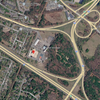Appeal heard in second suit filed against Guilderland, Pyramid
GUILDERLAND — A panel of five appellate court judges this week heard arguments in the second lawsuit to land in their laps over Pyramid’s proposed Rapp Road and Western Avenue projects.
Save the Pine Bush filed its suit in November 2020 based on the Guilderland Planning Board’s adoption of a findings statement for Pyramid’s proposed 222-unit residential development and Costco Wholesale store in addition to the site-plan approval given to the company’s apartment and townhome development — an approval that was given based on the findings statement.
A findings statement is part of the State Environmental Quality Review Act (SEQRA) process and is prepared after a final environmental impact statement (FEIS) has been filed but before the lead agency — in this case, the Guilderland Planning Board — makes its final determination about an action or project. A positive findings statement, like the one adopted by the planning board, indicates that the action or project has been approved by the lead agency after there has been consideration of the final environmental impact statement.
The findings statement also “demonstrates that the action chosen is the one that avoids or minimizes adverse environmental impacts presented in the EIS and weighs and balances them with the social, economic, and other essential considerations,” according to the state’s Department of Environmental Conservation.
Pyramid’s Crossgates Mall was built in the globally rare pine barrens that the not-for-profit Save the Pine Bush has been advocating to preserve since 1978.
In this suit, Save the Pine Bush claimed the planning board relied on an environmental impact statement that contained factual errors and conclusions not supported by empirical evidence, which is a violation of SEQRA, while also committing “procedural and jurisdictional errors” in adopting the findings statement and approving the site plan.
On Wednesday, attorney for Save the Pine Bush Todd Ommen contended he was before the judges because his “client finds itself dismissed from this case without any court having heard the substance of its claims.”
The appellate court is the middle-level court in the state’s three-tiered system.
Ommen said the basis of his clients’ case dismissal at the lower court level was an appeals court decision in a different case, one brought by a group of Westmere residents against Pyramid and the town.
The judge in Save the Pine Bush’s lower court case, Acting Albany County Supreme Court Judge Roger McDonough, when dismissing the case wrote that the appellate court in the Westmere resident suit had reviewed the “entirety of the underlying” SEQRA record and found the planning board had satisfied all its requirements. “Accordingly,” McDonough wrote, “the Court finds that the petition must be dismissed and the relief requested therein denied as to all SEQRA related claims.”
“They are completely different,” Ommen said of the two cases.
Save the Pine Bush alleged, among other things, the Guilderland Planning Board:
— Failed to take a “hard look” at the impact the project would have on “certain threatened or endangered species or species of special concern,” for example, the Karner blue butterfly, four types of bats, and a worm snake.
The planning board failed to consider the impact the project would have on two types of grass and on an ostrich fern.
Guilderland Supervisor Peter Barber, a lawyer who was arguing on behalf of the town on Wednesday, speaking to the grass and fern said, “ This is a level of review that is simply not required. We look at the most relevant, significant impacts, [and] they were identified very early in the process”;
— Failed to conduct a complete survey to assess for: the impact of pesticides and traffic, wetland presence, and the project’s impact on climate change and air quality;
— Failed to address the criticisms that followed publication of the draft environmental impact statement;
— “Included empirically false and unsupported assertions regarding the Albany Pine Bush ecosystem in the FEIS”; and
— “Improperly made determinations on the development projects despite not having the sufficient members required by law.”
Save the Pine Bush contrasted its lawsuit with the earlier suit brought by Westmere residents, which was overturned by the state Supreme Court’s Third Appellate Division in July of last year. The current Pine Bush suit says it is different than the earlier suit brought by the Westmere neighbors because that suit alleged the planning board had:
— Failed to consider a smaller alternative to the project as well as a residential alternative;
— Failed to evaluate the project’s compatibility with zoning and community character;
— Failed to take a “hard look” at the potential impacts the project would have on area avian populations;
— Failed to examine the project’s visual impact on the Rapp Road Historic District in addition to not performing a viewshed analysis; and
— Made errors with the way it declared itself the lead agency for the project.
Ommen said Save the Pine Bush “wasn’t even mentioned” in the Westmere resident petition.
Barber said the town had undertaken a two-year review of the project that was “complete and thorough,” and “what’s coming down here, your honors, is that they don’t like the fact that the planning board did not adopt their experts.”
Barber said, “That is a discretionary decision resting with the planning board.”
Ommen was asked what he believed should happen were the appellate court to rule in his favor. “The remedy should be to remand this to the Supreme Court for a hearing on the merits,” he said.



